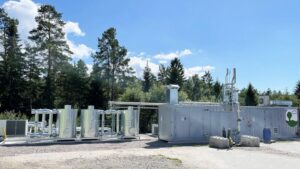EnviTec Biogas enters Swedish biogas market

Vårgårda-Herrljunga Biogas is expanding its biogas facility with another biogas plant, which will meet the prescribed DIN standard for vehicle fuel.
While the rated capacity of the new gas upgrading plant amounts to 402 Nm³ per hour of biomethane (600 Nm³/h of raw biogas, 65 vol. % methane), it is already prepared for a capacity expansion of up to 566 Nm³ per hour of biomethane (840 Nm³/h of raw biogas, 65 vol. % methane).
“Before selecting its second gas upgrading plant, the customer made a thorough comparison of the power consumption, the raw gas upgrading design, and the quality level – and it was our EnviThan technology that finally won them over,” said Maurice Markerink, managing director of EnviTec Plant Construction.
The scope of delivery includes a completely skid-based raw gas upgrading system, which enables short installation times on site.
The portfolio also includes an efficient two-stage gas cooling system, as well as the EnviTec Remote system and plant control developed by EnviTec.
The plant is connected to a local four-kilometer-long 4-bar gas network that is, in turn, connected to a high-pressure station.
Here, the pressure is increased to 250 bar. Biomethane can then be filled into mobile containers and delivered to a CNG filling station for future use as fuel.
The process developed by Evonik Industries and EnviTec is particularly environmentally friendly because it takes advantage of the different sizes and speeds of passage of gas molecules: since carbon dioxide molecules are smaller than methane molecules, they can migrate through the membrane much faster.
The methane remains on the high-pressure side of the membrane, while the CO2 molecules of the biogas pass through.
The gas upgrading process thus requires neither chemicals nor water or other additives.
The biomethane produced can now be used wherever natural gas is used – including the fuel sector.
EnviTec Biogas has had experience as a plant manufacturer in the Scandinavian and Baltic market for 9 years. “Our plants in Denmark are all running with stability and also our 4-year-old plants in Estonia continue to attract customers,” said Markerink.


























